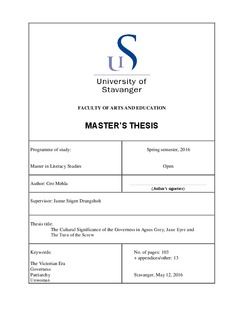The cultural significance of the governess in Agnes Grey, Jane Eyre and The Turn of the Screw
Master thesis
Permanent lenke
http://hdl.handle.net/11250/2400224Utgivelsesdato
2016-05Metadata
Vis full innførselSamlinger
- Student papers (HF-IKS) [884]
Sammendrag
My thesis explores how Victorian society viewed the women who did not live up to the female ideal created by patriarchy. I base my study on Anne Brontë’s (1820-1849) Agnes Grey (1847), Charlotte Brontë’s (1816-1855) Jane Eyre (1847) and Henry James’ (1843-1916) The Turn of the Screw (1898). I investigate and analyse the governess protagonists in these three novels in order to question the representation of women in Victorian novels.
I primarily base my theoretical work on feminist criticism, stretching from early feminist Mary Wollstonecraft’s (1759-1797) views on the domestication of women, to current critique on gender ideology as presented by Toril Moi. My chosen theorists contribute with their thoughts on patriarchy, traditional gender roles and the concept of the unwoman, or women as the nonsignificant other. As member of the middle-class, the governess, who typically did not marry and who entered the work market, was considered unfeminine and therefore a potential unwoman. She gives insight into the sociological and psychological factors that influenced Victorian women’s lives and psyches in a patriarchal society. The governess is among the few women who are in a position to cast a light on women’s life both in the domestic and in the public sphere.
My studies show that the governess enters the work force either as an escape from the domestic sphere, or because it is the only tolerably respectable way of making a living as an unmarried middle-class woman. In her position, she experiences stigmatization and great isolation. The Brontës attempt to reduce the governess’ otherness whereas Henry James’ novel portray her as a neurotic, sexually repressed woman. Public interest in the governess was apparent during the Victorian era, and the fascination with the governess as a literary character is still evident today.
Beskrivelse
Master's thesis in Literacy Studies
